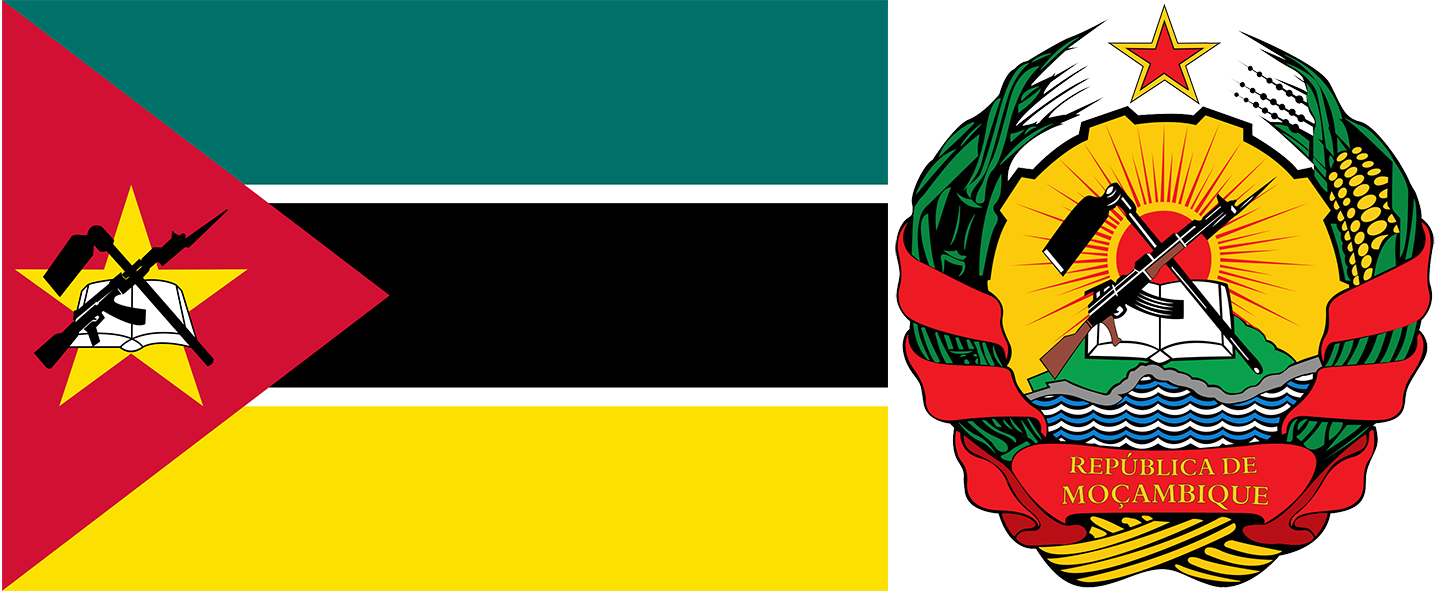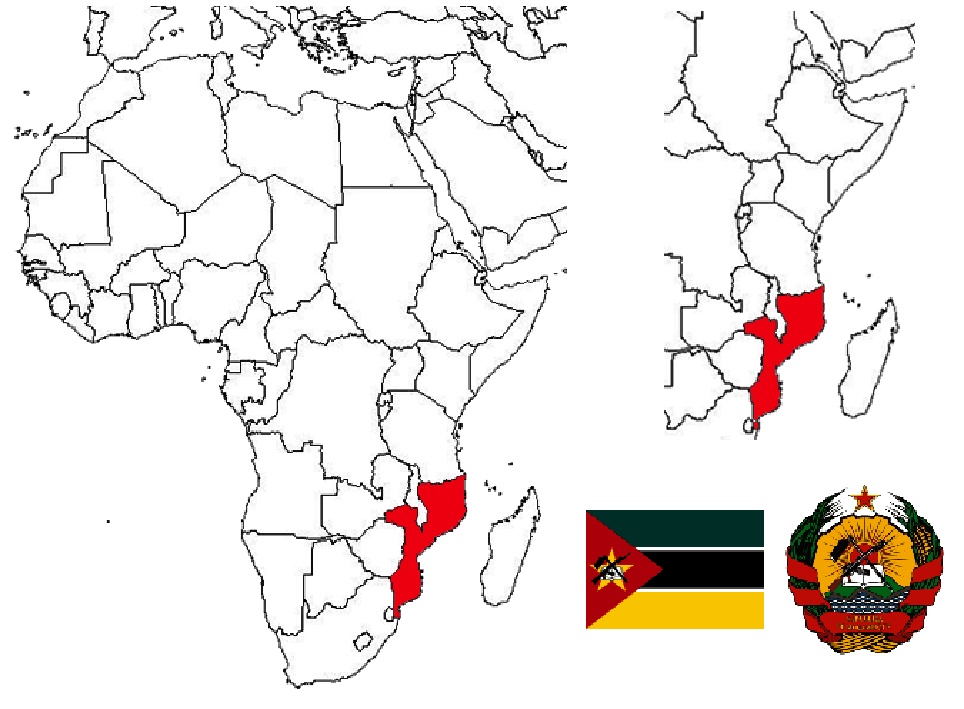FabulousFusionFood's Mozambican recipes Home Page
 The flag of Mozambique (left) and the Coat of Arms (right).
The flag of Mozambique (left) and the Coat of Arms (right).
Welcome to the summary page for FabulousFusionFood's Mozambican recipes, part of the African Continent. This page provides links to all the Mozambican recipes presented on this site, with 25 recipes in total.
Mozambique, officially: Repblica de Moambique, Republic of Mozambique is a Portuguese-speaking nation in East Africa. They were colonized by Portugal in 1505 and gained independence on June 25th 1975. The capital and largest city is Maputo.
Mozambican cuisine is exemplified by cornmeal, millet, rice or hot stews. Due to it's position in southern West Africa the country was n important stepping-off point for the spice trade. Contact with the Portuguese led to new spicing methods and the roasting of meats. Curries (locally called 'Caril') were introduced by Malay settlers and tend to be very hot. Indeed hot pepper, or 'Piri-Piri' sauces are very popular in Mozambique. The nation's staple, however, is a porridge made from a mix of ground maize and dried cassava.
Mozambique, (República de Moçambique in Portuguese) officially the Republic of Mozambique,[e] is a country located in southeast Africa bordered by the Indian Ocean to the east, Tanzania to the north, Malawi and Zambia to the northwest, Zimbabwe to the west, and Eswatini and South Africa to the southwest. The sovereign state is separated from the Comoros, Mayotte and Madagascar by the Mozambique Channel to the east. The capital and largest city is Maputo.
 The image above shows Mozambique (red) in relation to Africa (left) and
The image above shows Mozambique (red) in relation to Africa (left) and
East Africa (right).Between the 7th and 11th centuries, a series of Swahili port towns developed on that area, which contributed to the development of a distinct Swahili culture and dialect. In the late medieval period, these towns were frequented by traders from Somalia, Ethiopia, Egypt, Arabia, Persia, and India.[10] The voyage of Vasco da Gama in 1498 marked the arrival of the Portuguese, who began a gradual process of colonisation and settlement in 1505. After over four centuries of Portuguese rule, Mozambique gained independence in 1975, becoming the People's Republic of Mozambique shortly thereafter. After only two years of independence, the country descended into an intense and protracted civil war lasting from 1977 to 1992. In 1994, Mozambique held its first multiparty elections and has since remained a relatively stable presidential republic, although it still faces a low-intensity insurgency distinctively in the farthermost regions from the southern capital and where Islam is dominant.
Mozambique is endowed with rich and extensive natural resources, notwithstanding the country's economy is based chiefly on fishery—substantially molluscs, crustaceans and echinoderms—and agriculture with a growing industry of food and beverages, chemical manufacturing, aluminium and oil. The tourism sector is expanding. South Africa remains Mozambique's main trading partner, preserving a close relationship with Portugal with a perspective on other European markets. Since 2001, Mozambique's GDP growth has been thriving, but since 2014/15, both a significant decrease in household real consumption and a sharp rise in economic inequality have been observed. The nation remains one of the poorest and most underdeveloped countries in the world, ranking low in GDP per capita, human development, measures of inequality and average life expectancy.
The country's population of around 34,777,605, as of 2024 estimates, which is a 2.96% population increase from 2023, is composed of overwhelmingly Bantu peoples. However, the only official language in Mozambique is Portuguese, which is spoken in urban areas as a first or second language by most, and generally as a lingua franca between younger Mozambicans with access to formal education. The most important local languages include Tsonga, Makhuwa, Sena, Chichewa, and Swahili. Glottolog lists 46 languages spoken in the country, of which one is a signed language (Mozambican Sign Language/Língua de sinais de Moçambique). The largest religion in Mozambique is Christianity, with significant minorities following Islam and African traditional religions.
The country was named Moçambique by the Portuguese after the Island of Mozambique, derived from either Mussa Bin Bique, Musa Al Big, Mossa Al Bique, Mussa Ben Mbiki or Mussa Ibn Malik, an Arab trader who first visited the island and later lived there and was still alive when Vasco da Gama called at the island in 1498. The island-town was the capital of the Portuguese colony until 1898, when it was moved south to Lourenço Marques (now Maputo).
Mozambique, officially: Repblica de Moambique, Republic of Mozambique is a Portuguese-speaking nation in East Africa. They were colonized by Portugal in 1505 and gained independence on June 25th 1975. The capital and largest city is Maputo.
Mozambican cuisine is exemplified by cornmeal, millet, rice or hot stews. Due to it's position in southern West Africa the country was n important stepping-off point for the spice trade. Contact with the Portuguese led to new spicing methods and the roasting of meats. Curries (locally called 'Caril') were introduced by Malay settlers and tend to be very hot. Indeed hot pepper, or 'Piri-Piri' sauces are very popular in Mozambique. The nation's staple, however, is a porridge made from a mix of ground maize and dried cassava.
Mozambique, (República de Moçambique in Portuguese) officially the Republic of Mozambique,[e] is a country located in southeast Africa bordered by the Indian Ocean to the east, Tanzania to the north, Malawi and Zambia to the northwest, Zimbabwe to the west, and Eswatini and South Africa to the southwest. The sovereign state is separated from the Comoros, Mayotte and Madagascar by the Mozambique Channel to the east. The capital and largest city is Maputo.
 The image above shows Mozambique (red) in relation to Africa (left) and
The image above shows Mozambique (red) in relation to Africa (left) andEast Africa (right).
Mozambique is endowed with rich and extensive natural resources, notwithstanding the country's economy is based chiefly on fishery—substantially molluscs, crustaceans and echinoderms—and agriculture with a growing industry of food and beverages, chemical manufacturing, aluminium and oil. The tourism sector is expanding. South Africa remains Mozambique's main trading partner, preserving a close relationship with Portugal with a perspective on other European markets. Since 2001, Mozambique's GDP growth has been thriving, but since 2014/15, both a significant decrease in household real consumption and a sharp rise in economic inequality have been observed. The nation remains one of the poorest and most underdeveloped countries in the world, ranking low in GDP per capita, human development, measures of inequality and average life expectancy.
The country's population of around 34,777,605, as of 2024 estimates, which is a 2.96% population increase from 2023, is composed of overwhelmingly Bantu peoples. However, the only official language in Mozambique is Portuguese, which is spoken in urban areas as a first or second language by most, and generally as a lingua franca between younger Mozambicans with access to formal education. The most important local languages include Tsonga, Makhuwa, Sena, Chichewa, and Swahili. Glottolog lists 46 languages spoken in the country, of which one is a signed language (Mozambican Sign Language/Língua de sinais de Moçambique). The largest religion in Mozambique is Christianity, with significant minorities following Islam and African traditional religions.
The country was named Moçambique by the Portuguese after the Island of Mozambique, derived from either Mussa Bin Bique, Musa Al Big, Mossa Al Bique, Mussa Ben Mbiki or Mussa Ibn Malik, an Arab trader who first visited the island and later lived there and was still alive when Vasco da Gama called at the island in 1498. The island-town was the capital of the Portuguese colony until 1898, when it was moved south to Lourenço Marques (now Maputo).
Mozambican Cuisine
With a nearly 500-year presence in the country, the Portuguese have greatly influenced Mozambique's cuisine. Staples and crops such as cassava (a starchy root of Brazilian origin) and cashew nuts (also of Brazilian origin, though Mozambique was once the largest producer of these nuts), and pãozinho (pronounced [pɐ̃wˈzĩɲu], Portuguese-style buns), were brought in by the Portuguese. The use of spices and seasonings such as bay leaves, chilli peppers, fresh coriander, garlic, onions, paprika, red sweet peppers, and wine were introduced by the Portuguese, as were maize, potatoes, rice, and sugarcane. espetada, the popular inteiro com piripiri (whole chicken in piri-piri sauce), prego (steak roll), pudim (pudding), and rissóis (battered shrimp) are all Portuguese dishes commonly eaten in present-day Mozambique.The alphabetical list of all Mozambican recipes on this site follows, (limited to 100 recipes per page). There are 25 recipes in total:
Page 1 of 1
| Ambotic Origin: Mozambique | Frango Zambeziana (Zambezi Chicken) Origin: Mozambique | Peri Peri Kari Camarão (Fiery Prawn Curry) Origin: Mozambique |
| Caldeiraa de Cabrito (Goat Meat Stew) Origin: Mozambique | Kibeba (Cassava and Cuttlefish Stew) Origin: Mozambique | Pudim de Laranja (Orange Pudding) Origin: Mozambique |
| Camarão na Abóbora (Prawns in Pumpkin Shells) Origin: Mozambique | Mandioca Frita (Cassava Fries) Origin: Mozambique | Pudim de Peixe (Fish Pudding) Origin: Mozambique |
| Caril de Amendoim de Frango (Peanut and Chicken Stew) Origin: Mozambique | Matapa de Abóbora (Pumpkin Matapa) Origin: Mozambique | Shima Origin: Mozambique |
| Caril de Camarão (Prawn Curry) Origin: Mozambique | Matata (Clam and Peanut Stew) Origin: Mozambique | Sobremesa de Abacate (Avocado Dessert) Origin: Mozambique |
| Caril de Caranguejo (Crab Curry) Origin: Mozambique | Matsavo (Pumpkin Leaf and Peanut Flour Stew) Origin: Mozambique | Sopa de Feijao Verde (String Bean Soup) Origin: Mozambique |
| Caril de Marisco (Seafood Curry) Origin: Mozambique | Molho de Piri-Piri (Mozambican Peri-peri Sauce) Origin: Mozambique | Xima (Cornmeal Porridge) Origin: Mozambique |
| Chima de Arroz (Chima Rice) Origin: Mozambique | Mozambique Peri-Peri Origin: Mozambique | |
| Frango com Piri-piri (Piri-piri Chicken) Origin: Mozambique | Mozambique Prawns Origin: Mozambique |
Page 1 of 1